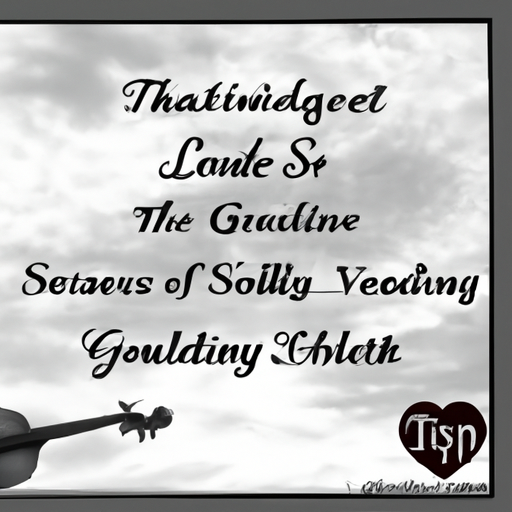In this article, you will find a beautiful reflection on the significance of Psalm 95:1-2. This passage is a call to worship, encouraging us to come before the Lord with joyful songs and shouts of praise. As we delve into the words of this Psalm, we will discover the power of gratitude and the importance of approaching God with a heart full of thankfulness. So, let’s explore the depths of Psalm 95:1-2 and uncover the transformative impact it can have on our lives.
Overview of Psalm 95
Introduction to Psalm 95
Psalm 95 is a hymn of praise and worship found in the book of Psalms. It is attributed to King David, who wrote many of the Psalms, although some scholars believe it may have been written by someone else during the time of David’s reign. This Psalm is significant because it invites the reader to engage in joyful worship and gratitude towards God.
Authorship and Background Information
As previously mentioned, Psalm 95 is attributed to King David, who was not only a skilled musician but also a man after God’s own heart. David composed numerous Psalms, which were often used in corporate worship gatherings and personal devotionals. The exact circumstances surrounding the writing of Psalm 95 are unclear, but it is believed to have been penned during a time of celebration and praise.
Verse 1: A Call to Worship
Understanding the Meaning of ‘Come, let us sing for joy to the Lord’
The first verse of Psalm 95 serves as an invitation to engage in joyful worship. “Come, let us sing for joy to the Lord” emphasizes the communal aspect of worship, encouraging unity among believers as they join their voices together in praise. It also highlights the importance of expressing joy and gratitude towards God through the act of singing.
Exploring the Significance of ‘Let us shout aloud to the Rock of our salvation’
The second part of verse 1 further emphasizes the enthusiastic nature of worship. By exhorting believers to “shout aloud to the Rock of our salvation,” the Psalmist calls for vocal expressions of praise and adoration. The phrase “Rock of our salvation” reminds worshippers of God’s faithfulness as their source of deliverance and protection.

This image is property of pixabay.com.
Verse 2: Expressing Gratitude
Unpacking the Phrase ‘Let us come before Him with thanksgiving’
Verse 2 of Psalm 95 highlights the importance of gratitude in worship. The phrase “Let us come before Him with thanksgiving” acknowledges the need to approach God with a grateful heart, recognizing His blessings and provision in our lives. This attitude of thankfulness allows us to cultivate a deeper connection with Him.
Meditating on ‘Let us extol Him with music and song’
The latter part of verse 2 emphasizes the role of music and song in expressing our worship to God. The word “extol” means to praise highly or to elevate, suggesting that our worship should exalt and honor the Lord. Music and song are powerful vehicles for conveying our love, adoration, and appreciation to God.
The Importance of Worship
Reflecting on Worship as an Act of Reverence and Adoration
Worship is not just singing songs or attending church services; it is an attitude of the heart. When we worship, we acknowledge God’s worthiness and honor Him as our Creator and Savior. It is an act of reverence and adoration, recognizing that He is deserving of our praise.
Understanding Worship as a Means of Connecting with God
Through worship, we are able to connect with God on a deeper level. It is a way for us to communicate with Him, express our love, and seek His presence. As we worship, our hearts are open to His leading, and we can experience a greater intimacy with Him.
Exploring the Role of Worship in Strengthening Faith
Worship has a transformative power that can strengthen our faith. When we pour out our hearts in worship, we are reminded of God’s faithfulness, His love, and His promises. It helps us to trust Him more, even in challenging times, and develops a deeper reliance on Him.

Comparing Old and New Testament Worship
Exploring the Shift from Temple-Based Worship to Personal Worship
In the Old Testament, worship was centered around the temple, with prescribed rituals, sacrifices, and a designated priesthood. However, in the New Testament, Jesus’s sacrifice on the cross opened the way for personal and direct access to God. Worship shifted from being solely centered on a physical location to a personal and spiritual connection with God.
Examining the Role of Music in Old and New Testament Worship
Music played a significant role in both Old and New Testament worship. In the Old Testament, music was used in temple ceremonies, processions, and festivals to praise and worship God. In the New Testament, we see references to singing psalms, hymns, and spiritual songs as a way to encourage and edify believers in their faith.
Understanding the Emphasis on Relationship in New Testament Worship
While both Old and New Testament worship emphasized reverence and adoration, the New Testament places a stronger emphasis on the relationship between believers and God. Worship in the New Testament is characterized by a personal and intimate connection with God through Jesus Christ. It is not just about external rituals but about a genuine heart engagement with God.
Applying Psalm 95:1-2 to Modern Worship
Drawing Inspiration from the Psalm in Contemporary Worship Practices
Psalm 95:1-2 serves as a source of inspiration for modern worship practices. It reminds us of the importance of coming together in unity and expressing our joy and gratitude to God through music and song. It encourages us to create an atmosphere of worship where believers can engage wholeheartedly and experience the presence of God.
Embracing the Invitation to Sing, Shout, and Give Thanks
The invitation given in Psalm 95:1-2 is just as relevant today as it was when it was first written. We are encouraged to embrace the joyful expression of worship by singing, shouting, and giving thanks to God. These actions not only glorify Him but also cultivate a spirit of joy and gratitude in our own lives.
Finding Ways to Incorporate Joyful Worship in Our Daily Lives
While corporate worship gatherings are important, our worship should extend beyond Sunday services. We can incorporate joyful worship into our daily lives by setting aside time for personal worship, engaging in gratitude exercises, and infusing our daily activities with a worshipful attitude. This allows us to experience the transformative power of worship on a regular basis.

This image is property of pixabay.com.
Finding Joy in Worship
Understanding the Relationship between Joy and Worship
Joy and worship go hand in hand. When we encounter God’s presence and experience His love and faithfulness, it naturally stirs up a deep sense of joy within us. Worship provides the space for us to express and cultivate that joy, allowing it to overflow into other areas of our lives.
Exploring the Transformative Power of Joyful Worship
Joyful worship has the power to transform our perspective and lift our spirits. It shifts our focus from our circumstances to the goodness and faithfulness of God. As we worship, we are reminded of God’s sovereignty and provision, filling us with a renewed sense of hope, peace, and joy.
Practical Tips for Cultivating Joy in Worship
Cultivating joy in worship requires intentionality and a posture of surrender. Some practical tips for fostering joy include immersing ourselves in worshipful music, engaging in heartfelt prayer, meditating on God’s Word, and seeking opportunities to serve and bless others. These practices help us to cultivate a heart of joy and gratitude, not only in worship but also in our daily lives.
The Power of Gratitude in Worship
Recognizing the Impact of Gratitude on Worship
Gratitude is a powerful attitude that shapes our worship. When we approach God with a thankful heart, it shifts our focus from ourselves to the goodness and provision of God. It reminds us of His faithfulness and invites us to respond with praise and adoration.
Practicing Gratitude as an Essential Component of Worship
Incorporating gratitude into our worship is essential. It not only honors God but also strengthens our relationship with Him. We can practice gratitude by intentionally reflecting on His blessings, keeping a gratitude journal, and expressing our thanks through prayer and worship.
Exploring the Benefits of Thankfulness in Spiritual Growth
Thankfulness is not only crucial in worship but also plays a significant role in our spiritual growth. It fosters humility, deepens our trust in God, and cultivates a heart of contentment and joy. The more we practice gratitude, the more we become aware of God’s presence and blessings in our lives, leading us to live a life of thanksgiving.

This image is property of pixabay.com.
The Role of Music in Worship
Examining the Biblical Foundation for Music in Worship
Music has a rich biblical foundation in worship. Throughout the Scriptures, we see numerous references to singing, playing instruments, and lifting our voices in praise to God. Music has the ability to touch our emotions, engage our minds, and draw us into a deeper experience of worship.
Understanding the Influence of Music on Worship Experience
Music is a powerful tool that can enhance our worship experience. It has the ability to stir our emotions, engage our senses, and create a space for us to connect with God on a deeper level. The melodies, harmonies, and lyrics of worship songs can help us express our hearts to God and create an atmosphere of intimacy and reverence.
Exploring Different Musical Expressions in Worship
Worship music takes various forms and styles, reflecting the diversity of cultures and preferences. From traditional hymns to contemporary praise and worship songs, there is a wide range of musical expressions that can facilitate authentic worship experiences. The key is to choose songs that align with biblical truth and resonate with the hearts of worshippers.
Conclusion
Summarizing the Key Messages of Psalm 95:1-2
Psalm 95:1-2 calls us to come together in joyful worship, expressing our gratitude and adoration to God. It reminds us of the importance of unity, thanksgiving, and the role music plays in our worship experience. This Psalm invites us to cultivate a heart of joy, gratitude, and reverence as we connect with God through worship.
Encouraging Personal Reflection and Application
As we reflect on Psalm 95:1-2, it is essential to consider how worship can transform our lives and draw us closer to God. We are encouraged to examine our own worship practices and explore ways to incorporate joyful and grateful worship into our daily lives. Let us ask ourselves how we can deepen our connection with God through worship and make it a heartfelt expression of our love and devotion.
Closing Thoughts and Insights
Psalm 95 offers us a profound invitation to engage in joyful and heartfelt worship. It reminds us that worship is not just an activity but a lifestyle that cultivates joy, gratitude, and transformative encounters with God. As we embrace the call to sing, shout, and give thanks, may our worship be a source of joy and strength, bringing us closer to the heart of God.








